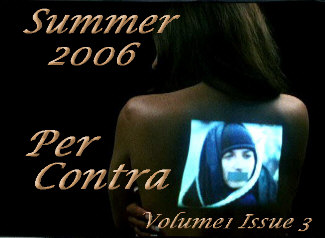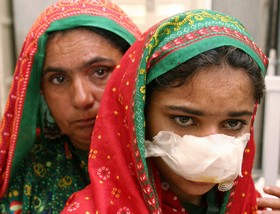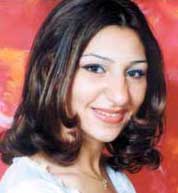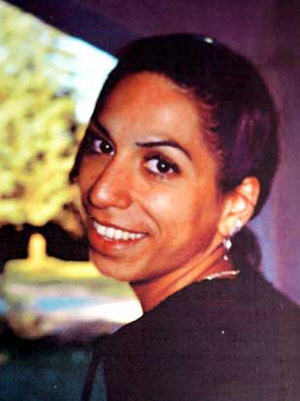
"Rana is in bad psychological condition," friend Sheatheh Ahmed said. "She was kidnapped by three masked men who told her they would burn her face with chemicals if she puts on such clothes again, and that this was her last chance." - Read the Complete Article

"[Iranian President] Mr. [Mahmoud] Ahmadinejad proposed to separate the sexes in universities and public places, the local press reported. In January, the government shut down a newspaper that ran a picture of women dressed in insufficiently Islamic garments and closed a women's publication." - Read the Complete Article

Ayesha Baloch was dragged to a field and as her brother-in-law held her down her husband sat astride her legs and slit her upper lip and nostril with a knife. - Read the full article
It is a simple tactic of distraction. They think by using a smokescreen of deception they don’t have to deal the real issues at hand. I think it’s much easier to attempt insult or launch accusations rather than addressing what I’m saying. It’s a difficult thing for anyone to examine themselves and admit to the negative aspects of their own community. However, for people to pretend like nothing is going on and attempting to discredit anyone that speaks about any of the problems within our community is, in my opinion, only highlighting the fact that they are actually a part of the problem. My birth name is Deepika which is considered a traditional Hindu name. I was given this name as a sign of respect and gratitude to an elder Indian Hindu woman who nursed and took care of my Muslim mother while she was pregnant with me. To suggest that one has to have an Arabic or Persian name in order to qualify as a Muslim is quite ridiculous and ignorant. My mother, father and their ancestors are all Sunni Muslims. It is much easier to dismiss me and what I am saying by stripping me of my heritage in the hopes that either people will not pay any attention to what I’m saying or that I will get scared or disheartened by the treatment of these critics to where I will hopefully shut up. It’s all an attempt to silence and intimidate anyone that says anything they’re not supposed to say. We are all so scared and busy upholding a certain image of the community that we are willing to turn a blind eye to things we know are going on. If we can’t even get to a point where we can admit and acknowledge some of these problems, the process of finding the solutions and creating change will never happen.
Because it has become so important to some Muslim leaders and extremists to discredit me as a Muslim, I have had to justify my existence as a “Muslim artist”. I have now inadvertently become a sort of spokeswoman for a younger generation western-born Muslim women. I never really set out to do this. My heritage is something I’ve always been proud of but never forced onto people. Despite this I have never really been allowed to just be an artist and to get on with just music. My background has always become an issue (and a negative one at that) within the community. After years of trying to be the obedient and quiet girl that I was told to be if I wanted to earn support from the community, my efforts were always proven to be wrong and of no use. Proven wrong usually by extremes (mostly men) who were afraid of losing their power in a changing community. The fact that I have chosen a profession that is largely considered unacceptable and not respectable for a Muslim woman has always attracted not just insults and condemnation from certain sections of the community, but also intimidation and physical attacks and threats. It is only after more than 10 years of being silent and quietly taking this abuse that I decided to speak out.
I think being a Muslim woman reduces my chances of being heard or being taken seriously. I come from a patriarchal culture where a woman’s voice does not bear the same weight and relevance as that of a man’s. I would probably be taken a lot more seriously if I nodded my head, agreed with everything, and said that unlike most other cultures, Muslims are perfect and are only the victims of unfair treatment by the Western world. Don’t get me wrong --I feel very strongly about prejudice and discrimination on all levels and am very sensitive to the fact that too many of our law abiding, intelligent and educated Muslim men are treated unfairly and discriminated against in the west every single day-- especially since 9/11. On the other hand, our girls are suffering behind closed doors at the hands of their “own”. Neither is right and there is no justification for racism and prejudice, just as there is no justification for sexism and gender apartheid. These are both severe problems that need addressing and a lot of work and healing is needed. But I cannot in good conscience only point the finger outwards without acknowledging the injustices within as well. I believe self-examination is a positive and crucial process if change is truly wanted. Having the right to freely question and independence of opinion and thought should not be punished but encouraged.
That is very much the case. Obviously, in countries like Afghanistan, Pakistan or in the Middle East, I doubt we would be extended the right to walk outside unaccompanied by a male watchdog, let alone being allowed to speak out about issues that are uncomfortable for many to admit in a male dominated culture.
In the West, I feel comfortable to air my views and live my life as I choose, although the concern of my and my family’s personal safety is a consideration I always have to take into account.
I receive countless letters and emails from other Muslims like myself who were born and raised in the west. These are people who are proud of their heritage and parents’ culture but who also value deeply the rights and freedoms we enjoy living in the West. The support I have received is from people who feel disheartened by how we are portrayed in the media, and who are also disgusted by how some of our so called representatives are responsible for breeding hatred rather than true tolerance. People have thanked me for not giving up and for daring to speak about what’s really going on. They have encouraged me to continue doing what I am doing. Many tell me in detail about their own experiences that are similar to my own and so many others. Another re-occurring statement is how they feel proud that someone like me is around as they feel it proves they can also live their dreams despite the hardships and imposed “traditional” roles we may face from our community. The majority of the responses are about hope and how it now seems possible that a positive Muslim person can be given a voice.

"Heshu Yones, a West London teen, fought off her father for a frantic 15 minutes. She ran from room to room in her family home one Saturday afternoon until he cornered her in a dingy bathroom, held her over the tub and slit her throat." - Read the full article
I would say my fan base is quite diverse-- comprising of young Muslims and Westerners from all walks of life. Having said that I very much get the sense that a lot of my fans feel they are outcasts in some way or another, that they somehow don’t feel like they find acceptance or understanding in their environment. I think women do tend to relate a bit more to what I am about, but the support I have had from my fans, whether they be Muslim, European, American, young, old, male or female has been quite amazing and humbling. I am privileged and extremely grateful for the support and encouragement of my fans it is one of the most important forces that drive me every single day.
I would say it’s both. In my mind women will be the true foundation of change. We tend to forget the effect we can have in our societies in contributing towards positive change. My work is very much a reaction and direct result of my experiences and the frustration of feeling helpless and silent for so long. It’s been a liberating experience for me to finally breathe and start speaking about the things that have been weighing on my mind and heart for many years. We have to be pro-active if we desire change in our reality, however this has to be an individual choice that we as women have to make. Change can be nurtured and encouraged but not imposed, not by me or a man. This is why I never presume to speak for all Muslim women because I don’t. I can only speak for myself and from my own perspective. If someone can relate to what I am about, then that’s great but I am not arrogant enough to tell people how they should or should not live their lives. I am not here to pass judgment on what other women choose to do. What matters to me is that a woman is truly free and independent and has a choice.
I am surprised at the great deal of offense taken by the birkah swimsuit scene rather than people taking offence to the maiming and killing performed in the name of religion and culture. The strong reactions I’ve received for this scene confirm the hypocrisy I wanted to highlight. Apparently skin is a bigger sin than murder in too many people’s eyes. Another message from my critics is very clear: that violence is OK but the actual criticizing of the violence is not OK. I find that very offensive. (However, I do not plan on sending people that disagree with me death threats. )
I would like to give you a tiny bit of background on some of the stories behind a few of the images used in this video.
- Shaima Rezayee (Afghanistan):
A female TV presenter on the Afghani music television channel Tolo TV (similar channel to MTV).
After fierce criticism by Muslim clerics and numerous threats in May 2005, Rezayee was shot dead at her home in Kabul. It was believed by the religious
authorities that Shaima could have a 'corrupting' influence on the youth of Afghanistan because of her western influenced persona and dress.
- Theo van Gogh (Netherlands):
In 2004, Theo Van Gogh was brutally murdered in Amsterdam in reaction to his film, 'Submission' which criticized the treatment of women under Islam. He was shot with eight bullets, his throat was slit and he was then stabbed in the chest. Two knives were left in his torso, pinning a five-page note to his body - the note threatened Western governments, Jews and his collaborator Ayaan Hirsi Ali.
- Heshu Yones (UK):
Heshu Yones was stabbed 11 times and her throat slit by he father, in the name of "honor". Her “crime” was falling in love with a Lebanese Christian boy.

Hatin Sucuru
-
Hatin Sürücü (Germany)
In 2005, 23-year-old Hatin Sürücü
was gunned down by her three
brothers -- who reportedly had long
been threatening her — in a
so-called "honor killing," given the
fact that Hatin's ultra-conservative
Turkish-Kurdish family strongly
disapproved of her modern and
"un-Islamic" life.
- Fadime Sahindal (Sweden)
Fadime Sahindal a young
Kurdish-Swedish woman in 2002, was
shot dead by her father, for
bringing “shame” on the family.
Fadime had “shamed” her father and
brother by rejecting arranged
marriage, and for choosing her own
partner. She had also “shamed” the
family in 1998 for a highly
publicized court case against her
father and brother who had
threatened to kill her.
- Sonay Mohammad (Denmark):
In 2002, 14 year old Sonay Mohammad
was found dead, killed by her own
parents, because she had fallen in
love with a Danish boy.
- Atefeh Rajabi (Iran)
Atefeh was sentenced to death by an
Islamic court. Atefeh only 16 years
old was hung from a crane in full
public view. She was put to death
for committing a so called "moral
crime".
In my opinion these people and
thousands like them are martyrs of
freedom of _expression and choice.
This is why I wanted to honor and
salute these people who tried living
their lives on their own terms but
were brutally silenced for their
individual choices. As you can see
from some of these stories we as
women are being routinely and
systematically punished for our
femininity and sexuality, by it
being the reason and justification
for brutality against us. Somehow by
being women who seek sexual,
financial and mental independence we
are asking for this treatment, being
called whores, threatened,
intimidated, silenced through fear
or in these cases killed. All this
under the protection of so called
honor, shame and culture.
There are various organizations
across Europe who are working hard
to highlight the problems of forced
marriages, honor killings, sexual
abuse and the struggles of our women
and youth. Here are only a few:
In France you have:
http://www.niputesnisoumises.com/
In Norway:
http://www.rights.no/
In the UK
http://www.southallblacksisters.org.uk/
and ASHRAM.
This has in no way been an easy choice to make nor has the experience been a pleasant one personally or professionally. In fact, my decision to speak about these issues has had a far more negative effect on my career and life than a positive one. Having said this I do not consider myself a victim I do not accept pity or sympathy. I have chosen to fight and to break the cycle of fear and silence. There is always a price to pay in standing up for your beliefs and integrity. I am painfully aware of this but choose to continue speaking through my music about the issues closest to my heart.
Although music and art can be perceived as provocative, controversial or even offensive to some, it is a peaceful form of _expression and protest, which I believe is extremely healthy and important. ‘What Will It Be?’ is simply a protest song. It is something I felt I had to do in order to overcome the ingrained fear that has been instilled in me from an early age of speaking out and questioning certain behaviors and traditions. It is a statement saying enough is enough whereby re-claiming my voice as an individual and taking back the control of who dictates the choices I make in my life. Change is slowly happening and we will no longer be silenced or intimidated by people who promote hate and fear in the name of culture and religion. With this video and song I wanted people to walk away with a better understanding of the pressure put on many people-- in particular women. It is predominantly about the silencing of alternative opinions and the punishment for living life on one’s own terms. I am a firm supporter of women’s rights, of human rights and the right to freedom of _expression and choice. This video is my _expression of those beliefs.
By becoming aware of the things that are going on and by not turning a blind eye to it. By not placing judgment on an entire community for the faults and hatred of some because this will not help the healing process and will only strengthen the walls of intolerance. To me, the most important thing is to respect a woman’s choices and decisions irrespective of whether it is pleasing to others or not. What we can not do is believe that violence against women is an exclusively Muslim or third world country problem, it is happening everywhere and should not be tolerated by us or society at large.
By helping to spread the word about the situation of many oppressed women and not forgetting the price some women are paying for even the smallest of personal liberties in some parts of the world--some with their lives.